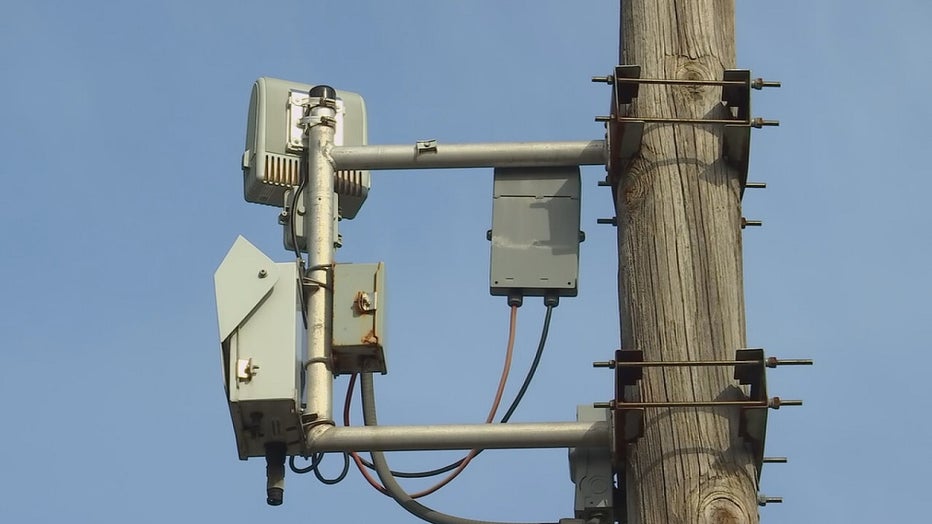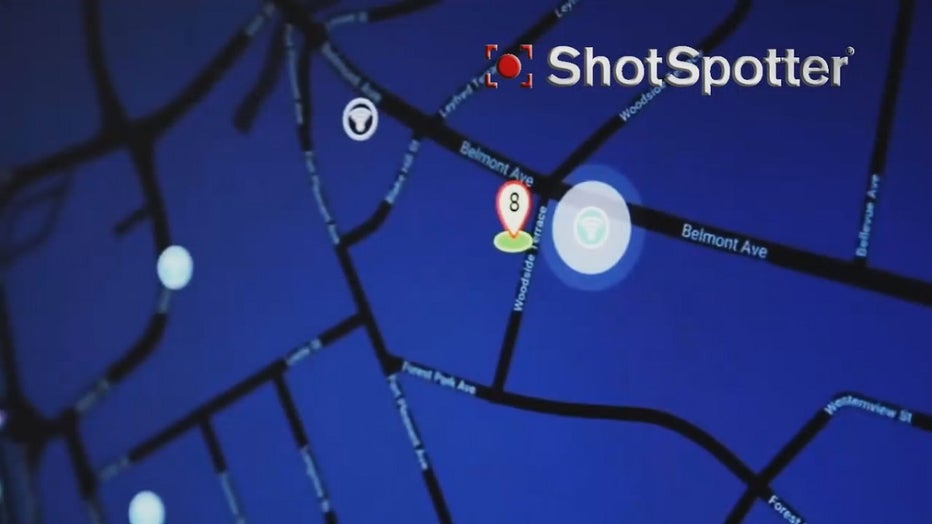ShotSpotter gunshot detection rarely leads to arrests in Minneapolis

Gunshot detection system rarely leads to arrests in Minneapolis
The gunshot detection system Minneapolis police use to notify them of shootings rarely leads to arrests or evidence of gun-related crimes, according to a FOX 9 Investigators analysis.
MINNEAPOLIS (FOX 9) - The gunshot detection system Minneapolis police use to notify them of shootings rarely leads to arrests or evidence of gun-related crimes, according to a FOX 9 Investigators analysis.
The technology known as ShotSpotter is made up of acoustic sensors capable of pinpointing where shots are fired and then alerts police. The City of Minneapolis has relied on the technology for almost 15 years and has paid more than $2 million for the service provided by the California-based company.
THE NUMBERS
Across certain neighborhoods in North and South Minneapolis, ShotSpotter acoustic sensors are strategically placed to monitor gunfire.
However, the FOX 9 Investigators have found when police respond to activations of the system, they often don’t find any evidence of a crime.
The FOX 9 investigators dug through thousands of records obtained from the Minneapolis Police Department through a public records request. The data documents all ShotSpotter activations from January 2020 through September 2021.
The data reveals during that timeframe, MPD responded to ShotSpotter activations roughly 8,500 times. About 80 percent of the time, officers documented no evidence of a gun-related crime. Only 32 total activations led to an arrest – that’s less than one percent of the time.
THE FACES OF GUN VIOLENCE
In Minneapolis, this past summer was one steeped in violence. Three children were shot in separate instances in a span of weeks. One of two young children who were killed was 6-year-old Aniya Allen.
"My granddaughter was the type of kid that you would instantly fall in love with," Aniya’s grandfather KG Wilson said. "Aniya was a light, a shining light, just love – the definition of love."
On May 17, Aniya was in the back of her mom’s car when police say she was shot in the head.
"It’s become heartless, ruthless, careless," Wilson said of the violence that claimed his granddaughter’s life.
The night of the shooting, ShotSpotter sensors detected at least four gunshots in the area of 35th and Penn Avenues.
However, six months later, the case remains unsolved. Aniya’s killer remains unknown.
QUESTIONING SHOTSPOTTER’S USEFULNESS
In recent months, the American Civil Liberties Union has questioned the usefulness of ShotSpotter in communities across the country.
"I think the big concerns here are that we don’t know how effective it is, we don’t know how often it’s sending police officers into communities on high alert for no reason because of false alarms," ACLU Senior Policy Analyst Jay Stanley said.

ShotSpotter equipment in Minneapolis (FOX 9)
ShotSpotter is currently used in 100 cities nationwide. However, the company often limits access of its data to the public and very few independent studies have been conducted.
The FOX 9 Investigators shared its findings with the ACLU, to which Stanley said: "That does raise questions about the overall worth wildness and the balance between the positives and negatives of this technology."
Uncertainty is what ultimately led the Mayor of St. Paul Melvin Carter to reject bringing ShotSpotter technology to his city, when the idea surfaced back in 2019.
"I think it would be a mistake to confuse buying one particular toy with reducing gun violence in our community," Mayor Carter said in a city council meeting. "And I think that’s an important mistake that we have to refuse the temptation to go down."
MINNEAPOLIS AND SHOTSPOTTER
The City of Minneapolis remains the only city in Minnesota with an active contract with ShotSpotter. In fact, the city has repeatedly extended and expanded its contract to the tune of more than $2 million.
Minneapolis police declined an on-camera interview with the FOX 9 Investigators. However, MPD released a lengthy statement, calling ShotSpotter a "valuable tool" that helps officers "quickly locate victims" in cases where shootings might go unreported by the public.
In a handful of cases, ShotSpotter has proven key in some criminal investigations.
For example, in September 2010 – ShotSpotter detected gunfire connected to the murder a man in North Minneapolis.
At the time, MPD brass credited ShotSpotter with helping to pinpoint surveillance video of the getaway car – a red Dodge Intrepid – which led to the capture and conviction of Christopher James Hayes for first degree murder.

ShotSpotter software
However, research conducted by the FOX 9 Investigators found in most cases, ShotSpotter activations do not lead to arrests.
ShotSpotter’s director of Public Safety Solutions Ron Teachman insists the technology is beneficial to the communities it serves.
"ShotSpotter can be effective in saving lives, reducing gun violence and enhancing community trust… whereas the outputs of arrests may not be the goal," Teachman said.
When pressed on the issue, Teachman elaborated: "Well, I think the goal would be deterrence. We’d like to stop the shootings before they even happen."
SEEKING ACCOUNTABILITY
There has been no independent study commissioned by the city to review how effective ShotSpotter is for Minneapolis.
City Council Vice President Andrea Jenkins told the FOX 9 Investigators she believes there should be a review or audit of the system. She represents Ward 8 in South Minneapolis which is a known problem area for gun violence.
"We have to try to use as many different mechanisms and technologies as we can to try to address those issues. That said, I think we have to try to use the most efficient ways to address those issues as well," Jenkins said.
As leaders of Minneapolis face questions about re-shaping the future of policing, Jenkins said the city must consider smart use of lean resources, especially with the current understaffing of the police force.
"I think there may be some value to ShotSpotter. However, it probably is one of the least efficient ways to prevent gun violence and gunshots in our communities," Jenkins said.
As for those who have suffered the ultimate loss to gun violence like KG Wilson and his family, they expect more, they expect results and they expect accountability.
Wilson said justice comes in the form of "arrests, arrests, arrests." He also believes ShotSpotter is not worth the price tag when considering how few arrests have been made.
"That’s crazy. You know, that’s not enough help," Wilson said.
While it may be hard to quantify exactly how beneficial ShotSpotter is for Minneapolis, city leaders should be asking those questions – including whether it’s truly making Minneapolis any safer.
MPD FULL STATEMENT:
"ShotSpotter is a valuable tool: It provides geographically accurate information related to the location of gunfire. In cases where individuals are injured by gunfire, officers are able to quickly locate the victims. This provides officers the ability to provide lifesaving care when seconds matter. Without ShotSpotter, officers typically have to triangulate the location of victims based on information from 911 callers. This can add minutes to locating a victim as compared to incidents where ShotSpotter is available.
The provision of geographically accurate information related to the location of gunfire is also important in the collection of evidence related to gunfire. Discharged Cartridge Cases (DCC) are important evidence. Each DCC has unique markings made by the gun from which it was discharged. DCCs collected as evidence are entered into the National Integrated Ballistic Information Network (NIBIN). DCCs collected as evidence have been linked to guns linked to crimes linked to people who are then arrested and charged. In some cases, DCCs collected as evidence are linked to guns that have been linked to multiple crimes which resulted in arrests and charges. ShotSpotter increases the likelihood that evidence will be located. DCCs are small. ShotSpotter provides detailed geographical information allowing officers to focus their search on a specific area thereby increasing the probability that evidence will be located.
ShotSpotter went live in 2007. In 2008, 150 DCCs were recovered. By 2009, that number increased to 300 DCCs. In 2021, over 1600 DCCs have been recovered as evidence. ShotSpotter undoubtedly contributed directly to that level of evidence collection.
When addressing the question about ShotSpotter’s value. It is important to evaluate the value of the system as it relates to the impact on individual human lives. Victims are located more quickly and are able to receive timely, lifesaving care. When evidence gathered as the result of key information provided by ShotSpotter has led to an arrest, charges, and successful prosecution, the value of justice served is significant for those who are victims of gunfire, the people who love them, and the community where they live.
ShotSpotter is an important technology that is part of a larger system of investigative tools which together serve as effective means through which law enforcement solve violent crimes involving gunfire."

